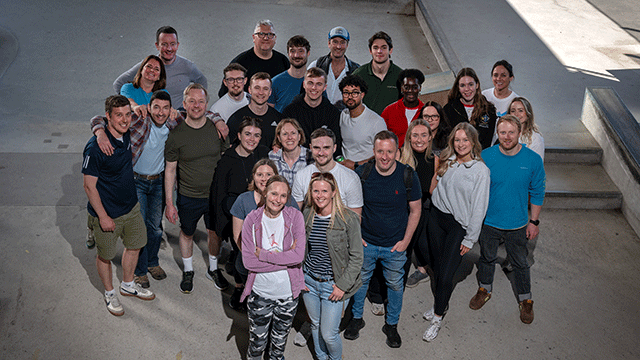REI is the only REIT specialising in the Midlands: chief executive Paul Bassi is thinking about capitalising on that in the Far East off the back of Birmingham’s growth. He tells EG how
“Why don’t I like doing interviews?” mulls Paul Bassi. “I don’t not like doing them. Has somebody told you I don’t like doing them?”
The chief executive of Real Estate Investors is sitting comfortably in the company’s expansive boardroom, overlooking Birmingham’s Colmore Row. Dapper in a sharp blue suit, trim for his 55 years, the Birmingham property veteran is a lord in his realm. He is also being a little defensive.
He concedes he has just come off a week of what he describes as the investor roadshow: six or seven interviews a day with analysts, shareholders and anyone else with an interest in the West Midlands-based investor.
And what they all asked, he says, was: “Are you building this up to sell it, Paul?”
And why not, of course? The REIT’s first annual results were released in February: revenue was up 61% and profit before tax had almost tripled since its conversion in January 2015. The dividend was up by more than 30% on its £200m portfolio. Now would be a great time to sell up. During Bassi’s 34 years in the property game, the West Midlands has arguably never looked stronger.
But while he cannot rule out a sale, that’s not the plan.
“We will do whatever it is that’s in the best interest of shareholders… if we got the right approach, we would consider it,” he says. “But we have a plan, a great team, a great business.”
Basically, Bassi wants to continue to grow with the Birmingham market. And that business could get a lot bigger.
He says REI is in the early stages of considering a listing on an alternative market – the Hong Kong Stock Exchange – to tap into new investors for what he describes as Birmingham’s golden era.
REI in a nutshell
- Total portfolio of £201.9m; grown from £56.5m in 2010
- Revenue of £13.5m
- Contracted rental income £14.9m
- Occupancy 93%
- 19% of the portfolio in central Birmingham, 77% around the rest of the Midlands
- Bassi took a 29% share in the company in 2006, then became full-time chief executive in 2007
On Birmingham
Bassi does not consider himself a Brummie, despite being born in the city, but he is enormously proud of it and earnestly believes its time is now.
“I don’t think there is any need for us to be the second city of the UK. We should aim to be the second city of Europe,” he says.
Hence the listing, and the intention to tap into international investors who still want to buy into UK plc but are tiring of London trophy assets.
“There is a new investor base coming to Birmingham,” he says. “In the past few years every football club we have has been bought by Chinese buyers and they have invested in a number of joint ventures and schemes with the council. I do not think that is the end of their investment; I think it’s the beginning.”
Large-scale overseas investment into the Birmingham market has so far been hard to pin down – unlike Manchester, which has seen huge buy-in from Asian and Middle Eastern investors. So far, Birmingham Council has managed to sign a memorandum of understanding with Chinese residential developer Country Garden, while Qatar has also said it is to invest billions in the city – but neither has led to anything concrete.
While investors have traditionally favoured large trophy assets, Bassi says, they are growing tired of their exposure to only London, but still want to increase their exposure to the rest of the UK.
REI international?
What REI does is quite a stretch of imagination from owning a London trophy asset. Its sweet spot for investment is between £2m and £20m, with the potential for active management.
“We are a traditional, roll‑your‑sleeves‑up, hands‑on property business. We know our patch. Mostly we know a building without even having to go and look at it.”
On the other hand, the company is not to be thought of as cheap and cheerful.
“I don’t think we do buy assets cheaply: we pay the market price at any given point in time. What we are good at is adding value to those assets, through a planning consent, letting or refurbishment.”
It has been enormously successful, but not exactly what the average sovereign wealth fund or high-net-worth individual wants. How does Bassi reconcile that?
“Birmingham is not a hard sell at all at the moment, because they are looking for a home for their capital away from London,” he says. “Having a few trophy assets in London and some very nice assets in the UK seems a very sensible way forward.”
Birmingham plc
He does say, however, that effectively selling the city is going to be the new mayor’s most critical job.
“There is a lot going very right for us at the moment. The key thing for whoever is going to be our mayor is to get the message of this area out. We have got to make people realise this is not the old Birmingham – we are entering a new era.”
And while Bassi wanted to remain in the European Union, he believes the city could benefit from the decision to leave.
“I think that has reminded politicians and government that you cannot continue to launch capital in London and the South East and expect to be voted into power,” he says.
Bassi’s confidence in Birmingham is infectious, but we have been here before. In 2006 and 2007, new investors were flooding into the market and the city was on the rise, but the financial crisis put paid to that. Indeed, this was when Bassi started to build up REI from its modest beginnings.
So is safe and sensible REI getting over‑confident, along with the city?
Bassi says the company will not be diverging from office and retail investment, and will stick to what it understands, which means no direct development.
“Subject to marketplaces changing, it is most likely that we will continue to do more of the same. It works – it has been working for 35 years – we will build a mini Land Securities, or a mini British Land, excluding development.
“I tell you what we are known for: if we say we are going to do something, we do.”
As the city looks to capitalise on HS2, new transport infrastructure, more internal investment and the momentum from the new mayor, that’s not a bad position to be in at all.
To send feedback, e-mail alex.peace@egi.co.uk or tweet @egalexpeace or @estatesgazette











